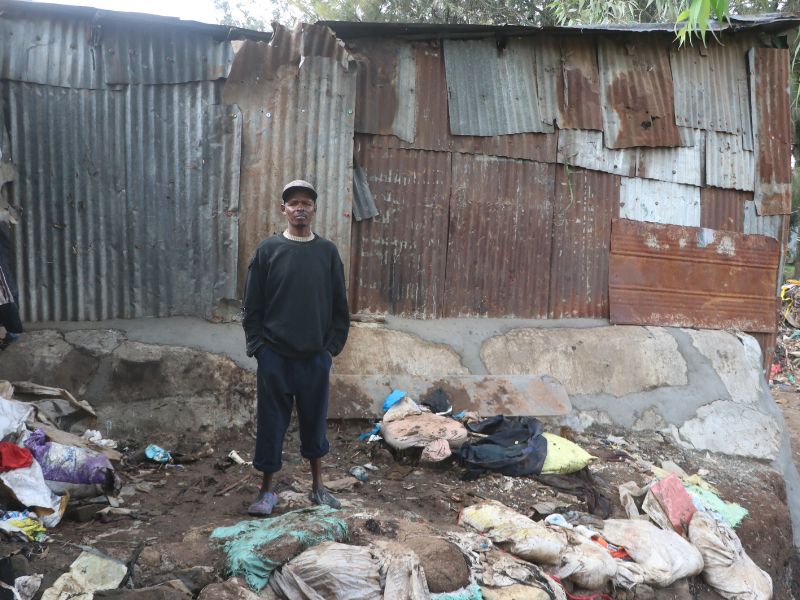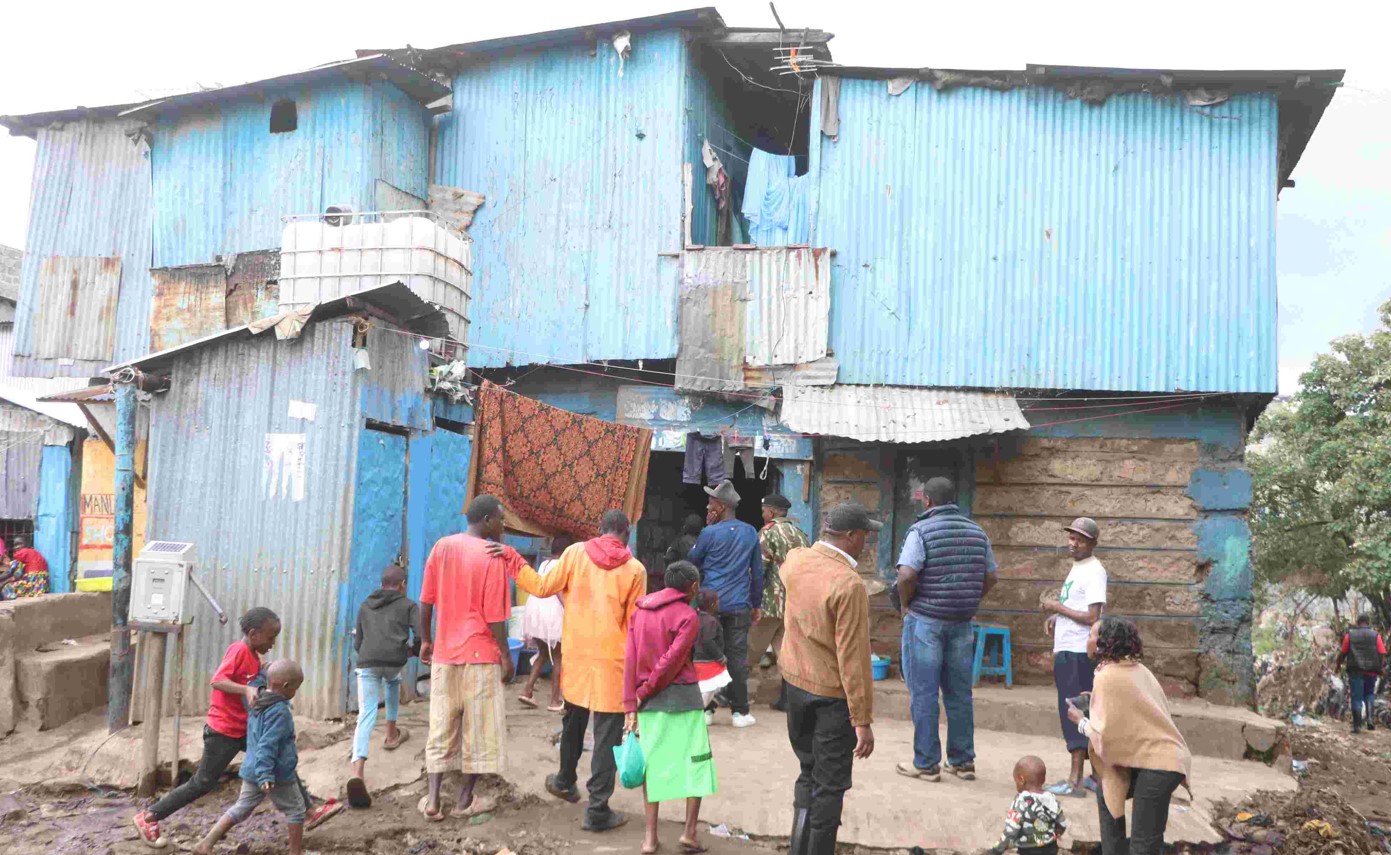Despair as resident of Kamukunji's Kitui Village faces flooding aftermath

Seven days have passed since relentless floodwaters ravaged Kamukunji's Kitui Village, leaving a landscape of destruction and despair.
With nothing but the clothes on his back, Jackson Mwangangi stands amidst the remnants of what was once his cherished home in Kitui Village, Kamukunji Sub-county, Nairobi.
It is Tuesday—nine days since relentless floodwaters ravaged the village, leaving a landscape of destruction and despair.
More To Read
- Kenya Met forecasts intermittent showers, cold nights over next five days
- Met Department forecasts wet, sunny conditions across Kenya in next five days
- KEMRI, Health Ministry warn of potential malaria outbreak in Kakamega
- More rain, possible flooding expected across Kenya this week- Met
- Race against the rains: Nairobi and Kiambu counties rush to unclog drainages and stop flooding
- Five-day forecast predicts intense rainfall across the country
What was once a place of solace and security now lies in ruins, a solemn testament to the heartache and loss endured by Mwangangi and hundreds of others.
"I haven't been able to find my footing since the floods," Mwangangi says. "I have nowhere to turn and no resources to rebuild. Everything I worked for ... everything I cherished has been swept away."
In the wake of the disaster, Mwangangi finds himself grappling with the daunting reality of homelessness.
The familiar sights and sounds of his neighbourhood have been replaced by the silence of desolation. With each passing day, the weight of uncertainty grows heavier on his shoulders, leaving him adrift in a sea of despair.
"I watch as my neighbours pick up the pieces and move forward," Mwangangi reflects, his eyes betraying a mixture of admiration and longing. "But for me, the path ahead seems insurmountable. I don't know where to begin."
 The aftermath of heavy rains and flooding in Kitui Village, Kamukunji Sub-county, Nairobi, as pictured on April 2, 2024. (Photo: Justine Ondieki)
The aftermath of heavy rains and flooding in Kitui Village, Kamukunji Sub-county, Nairobi, as pictured on April 2, 2024. (Photo: Justine Ondieki)
Throughout Kitui Village, similar tales of hardship and heartbreak unfold as residents confront the harsh realities of displacement and destitution. For many, the floodwaters have washed away not only their homes but also their hopes for the future.
In the absence of government assistance, they fend for themselves, navigating a landscape fraught with uncertainty and peril.
"It's been a week, and still I have nowhere to go," Mwangangi says. "I sleep in my neighbour's shop, with nothing but the rodents to keep me company. Each night, I pray for a miracle, for a glimmer of hope to light my way forward."
When disaster strikes, victims rely heavily on the generosity of well-wishers, and their circumstances are worsened by the high cost of living.
Many slum dwellers live hand-to-mouth, with little to no savings to fall back on in times of crisis.
Mwangangi, a manual labourer who primarily relies on pushing a cart or "mkokoteni," to make ends meet, earns as little as Sh50 to Sh100 per day, a meagre income that barely covers his basic needs.
"Due to the floods and cold weather, I'm currently grappling with occasional chest pain, sometimes even coughing up blood. However, amidst the ongoing doctors' strike, I'm compelled to endure, hoping that the pain will subside on its own."
As some residents move on, others, like Mwangangi, struggle to rebuild their lives. Cold nights and the constant reminder of their submerged homes haunt them.
 Part of Kitui Village in Kamukunji Sub-county, as pictured on April 2, 2024, when authorities asked residents to move to safer locations following a warning of heavy rains and flooding. (Photo: Justine Ondieki)
Part of Kitui Village in Kamukunji Sub-county, as pictured on April 2, 2024, when authorities asked residents to move to safer locations following a warning of heavy rains and flooding. (Photo: Justine Ondieki)
Kitui Village, home to over 20,000 residents, is one of the parts of the city that bore the brunt of the floods.
The devastation is akin to what was witnessed during the El Nino rains of 1997-1998, hence the urgent need for mitigation measures.
Chairperson Nzioka Kilonzo recounts the harrowing experiences of rescue and loss.
"We rescued people trapped in the floods but many are still reeling from their losses," he says, acknowledging the challenges of aiding displaced families.
"We're advising residents to stay safe and seek refuge wherever they can find it," he says.
He added, "Several members of Kitui Village sought refuge in the local church, particularly women and children who were whisked away to safety during the floods. However, they all returned to their homes, braving the aftermath of the disaster.".
 Kitui Village chairperson Nzioka Kilonzo speaks to journalists on April 2, 2024, when he urged residents to move to safe locations following a floods warning. (Photo: Justine Ondieki)
Kitui Village chairperson Nzioka Kilonzo speaks to journalists on April 2, 2024, when he urged residents to move to safe locations following a floods warning. (Photo: Justine Ondieki)
Kilonzo regrets that he cannot assist the people who approach him for financial aid as he lacks the means.
As Kilonzo tours the village on Tuesday, appealing to residents to move to safer locations following the weatherman's fresh warning of heavy rains and flooding, a tenant approaches him, expressing frustration over being evicted without prior notice due to failure to pay rent.
He promises to intervene.
The Kenya Meteorological Department has warned the public about strong winds, heavy rainfall, and potential flooding in various parts of the country.
In its forecast for April 2 to 8, it says the Central Highlands, Western Kenya, Rift Valley, Southeast Lowlands, Coast, Northeast, and Northwest are expected to receive heavy rainfall.
Top Stories Today














































